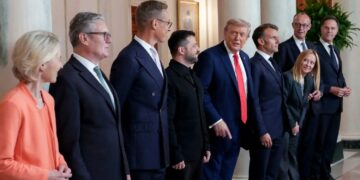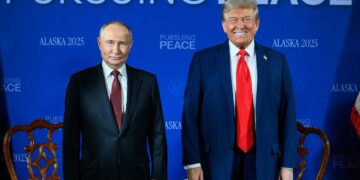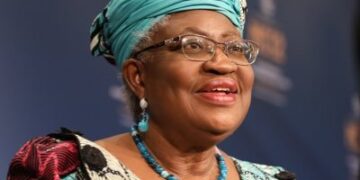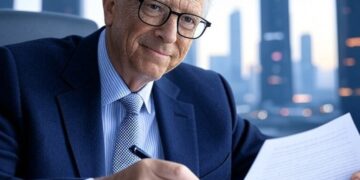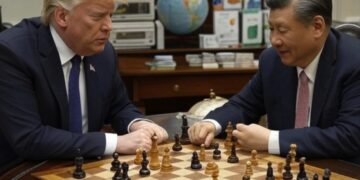In a dramatic Oval Office meeting on May 21, 2025, U.S. President Donald Trump ambushed South African President Cyril Ramaphosa with a video montage and news clippings alleging a “white genocide” in South Africa, spotlighting Economic Freedom Fighters (EFF) leader Julius Malema. The fiery exchange, which saw Trump demand answers about Malema’s controversial “Kill the Boer” song and land expropriation rhetoric, has ignited a political firestorm back home. Malema, never one to shy away from confrontation, responded with characteristic defiance, dismissing the spectacle as a group of “older men gossiping” about him and reaffirming his unyielding stance on land reform.
The meeting, intended to mend strained U.S.-South Africa relations, quickly derailed when Trump played a four-minute video featuring clips of Malema singing the apartheid-era struggle song “Kill the Boer” and advocating for land expropriation without compensation. Trump, flanked by South African-born adviser Elon Musk, pressed Ramaphosa on why Malema had not been arrested, falsely claiming the clips evidenced systematic persecution of white farmers. Ramaphosa, maintaining composure, countered that Malema’s Economic Freedom Fighters represent a minority party, garnering just 9% of the vote in last year’s elections, and that their rhetoric does not reflect government policy. He emphasized South Africa’s constitutional protections for free speech, noting that the Supremeswana Court of Appeal has ruled the song is not a literal call to violence but a symbolic protest rooted in the anti-apartheid struggle.
Malema took to X with a sharp retort: “A group of older men meet in Washington to gossip about me. No significant amount of intelligence evidence has been produced about white genocide. We will not agree to compromise our political principles on land expropriation without compensation for political expediency.” His statement underscores the EFF’s unwavering commitment to redressing historical land inequities, a cornerstone of their platform since their founding in 2013. Malema’s response also framed Trump’s accusations as an attack on South Africa’s sovereignty, echoing sentiments he expressed earlier this year when Trump threatened to cut U.S. aid over the Expropriation Act.
In February 2025, Trump announced a freeze on nearly all U.S. aid to South Africa, citing the Expropriation Act, which allows land seizures in rare public interest cases. Malema, at the time, condemned the move as “offensive” and a reminder of imperialist influence, stating, “Reliance on foreign aid surrenders us to the will of imperialists who use money to dictate Africa’s policy direction.” His latest comments double down on this narrative, positioning the EFF as a bulwark against external meddling.
The Oval Office clash has exposed deep divisions in South Africa. Right-wing Afrikaner groups, like the Solidarity Movement, celebrated Trump’s intervention, with leader Ernst Roets declaring it “historic” for highlighting farm murders. Conversely, Ramaphosa’s African National Congress (ANC) and analysts like Kagiso “TK” Pooe praised the president’s diplomatic restraint, with ANC’s Fikile Mbalula lauding him for setting the record straight. However, the EFF criticized Ramaphosa’s delegation for failing to “dispel the white genocide myth,” calling their performance “dismal.”
South Africa’s crime statistics paint a more complex picture. In 2024, police recorded 26,232 murders nationwide, with only 44 linked to farming communities, eight of whom were farmers. The majority of victims in such crimes are Black, reflecting the broader crime epidemic rather than targeted racial violence. The Expropriation Act, signed into law in January 2025, has yet to be implemented, and no land has been seized, despite Trump’s claims of widespread confiscation. Whites, making up 7% of the population, still own 70% of commercial farmland, a legacy of apartheid’s systemic dispossession.
Malema’s rhetoric, while provocative, resonates with millions who see land reform as unfinished business three decades after apartheid’s end. His refusal to back down in the face of Trump’s accusations has galvanized his base but risks further polarizing South Africa’s already fractured political landscape. As Ramaphosa navigates diplomatic fallout and domestic pressures, Malema’s defiance ensures the land debate remains a lightning rod for global and local scrutiny.
For stakeholders, this saga underscores the delicate balance between addressing historical injustices and maintaining international relations. The EFF’s radical stance may fuel tensions, but it also amplifies the urgency of equitable land reform. As South Africa hosts the G20 summit later this year, all eyes will be on how Ramaphosa counters Trump’s narrative while advancing his government’s unity agenda. Malema, meanwhile, shows no signs of tempering his revolutionary zeal, ensuring the fight for land—and South Africa’s soul—remains front and center.





